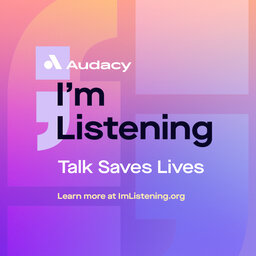Talk Away The Dark: Straight Talk With Men
I'm Listening
It’s okay to not be OK. We know the power of talk can save lives. Audacy's I’m Listening aims to share valuable resources for those who need to connec…The following article and accompanying audio include discussions of mental health and suicide. If you or someone you know needs help, call 988.
Mental health struggles don’t discriminate and that leaves everyone vulnerable, including the roughest and toughest of men. Often feeling pressure by society to hide emotion and stay stoic, many males are finding themselves struggling. Audacy, along with the American Foundation for Suicide Prevention (AFSP) are here to start the conversation surrounding men and mental health, because talk saves lives.
Audacy’s David Glover, joined by AFSP expert, Vic Armstrong and guest/previous AFSP board chair, Steve Siple, got candid about the struggles of men and mental health by starting with their own stories on the latest episode of Audacy’s I’m Listening 'Talk Away The Dark' podcast.
“We’re wired to survive and solve problems and produce as men,” Siple shared of his own feelings of why he struggles with his mental health. “Unfortunately, some of us will get to a place where we’re trying to solve a lot of problems that either don’t exist and are just perceived, or we are over-stating the severity of those problems.”
Added Armstrong, “That voice in my head thinks I can overcome anything, that voice in my head thinks that I should be able to power through anything and I think as men, we’re socialized to believe that strength is in being able to do it by yourself, that it’s a sign if weakness when you have to ask for help.”
What they’re out to prove is that strength is actually found in the power to ask and accept help in order to regain control of your life. Easier said than done, AFSP expert, Armstrong reminds us that we all have the capability to help out our loved ones and even save a life by speaking up and being direct when we notice things are off.
“We tend to talk about it like suicide, itself, is a disease,” Armstrong said. “Suicide itself is not a disease, it is the worst possible outcome of a combination of a lot of very complex things including mental health challenges… If you are concerned of someone who may be thinking of suicide, don’t be afraid to ask them the question — ask them clearly, concisely and confidently, ‘Are you thinking about suicide?’ You may not be able to move someone from their suicidal thoughts in one conversation, but you can absolutely save a life in one conversation.”
Siple is living proof of the power that question holds. During their conversation, he shared his story of surviving suicidal thoughts after a friend asked him that exact question, which ultimately opened the door to the help he so desperately needed. “I had a pretty acute suicidal ideation one day and the next week I was at a meeting,” he shared. “I was with a friend of mine who is also part of AFSP and when we left that meeting, outside of the building, my friend turned to me and noticed that there was something different about me and straight out asked if I’d been thinking about suicide.”
He continued, “I teared up, I admitted I had, I thanked her. That was the button that needed to be pressed for me to one, increase the frequency of my therapist visits [and] two, admit to my wife what I had been feeling — I hadn’t even admitted it to my closest love. It was like permission to talk about it.”
While the fearlessness to ask the question can most definitely be life-saving, Armstrong reminds us there are many things we can do before things reach life-threatening levels — one of them being creating a safe space for vulnerability.
“I often found that men didn’t have the language to talk about emotion and that impacts our mental well-being because when we can’t identify that what we’re really feeling,” he said. “One of the best things you can do for the man/men in your life is create a safe space for them to be vulnerable [and] talk about when they’re feeling like they’re overwhelmed or when there are things they feel like they can’t deal with as opposed to feeling like ‘I can’t show vulnerability.’”
Sure to highlight the change a support system can make, Armstrong, Siple and Glover also recognize it’s not a reality for all and encourage anyone struggling to find the bravery to advocate for themselves and get the help they need.
“To anyone out there who is listening, just know that if you’re struggling — your pain matters, your life matters,” said Armstrong. “If you are considering suicide, or if you’re just experiencing some kind of mental health challenges, get help. You can always dial 988 and be connected to a trained counselor who can connect you with the help, the services, with the support that you need when you need it most.”
Audacy's I’m Listening initiative aims to encourage those who are dealing with mental health issues to understand they are not alone. If you or anyone you know is struggling with depression or anxiety, know that someone is always there. Additionally, the Suicide & Crisis Lifeline is available 24 hours a day, 7 days a week at 988. Find a full list of additional resources here.
Words by Monica Rivera Interview by David Glover
 I'm Listening
I'm Listening


